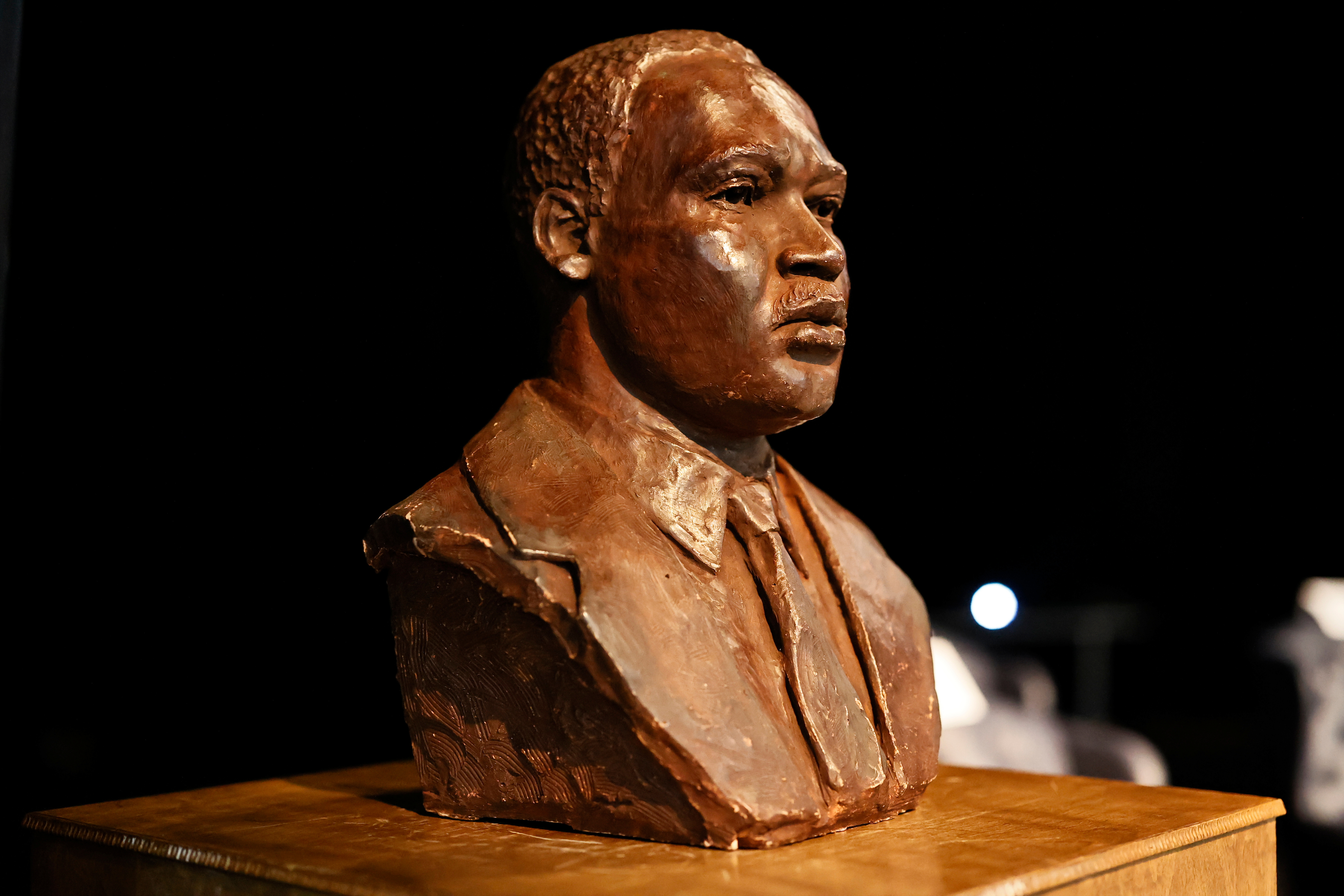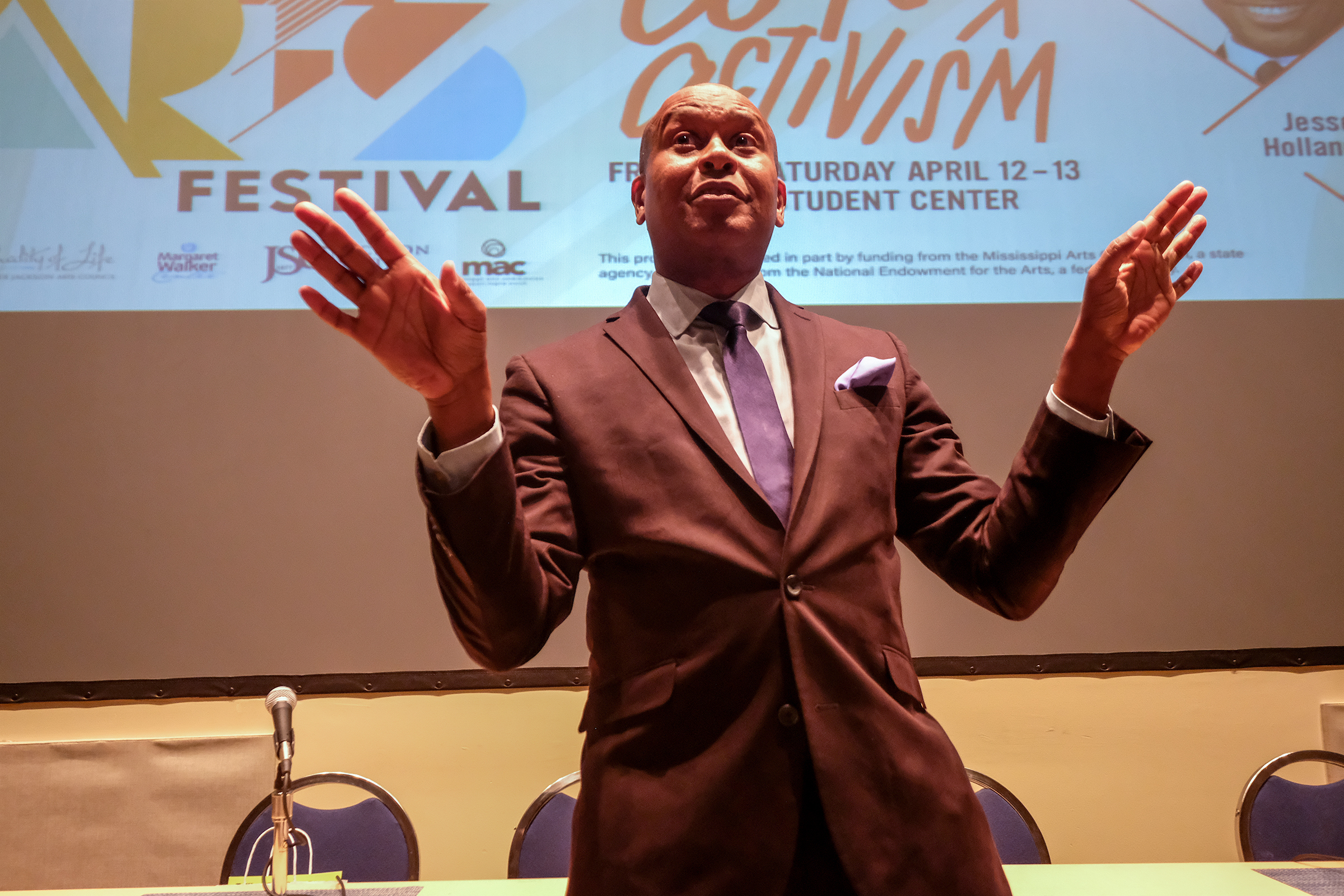
![]()
[hr][hr]
Hidden treasures and intellectual jewels abounded at the 13th Annual Creative Arts Festival hosted by the Margaret Walker Center, Mississippi Humanities Council, Mississippi Arts Commission and the Greater Jackson Arts Council, April 12-13, primarily in the JSU Student Center. This year’s theme was “Art and Activism.”
“Our goal with the Creative Arts Festival is to give students the opportunity to interact with and learn from some of the great scholars, artists, activists, and writers of the day and to uplift the work those students are doing in their own right,” said Dr. Robert Luckett, director of the Margaret Walker Center.
From the “Everywhere with Roy Lewis” exhibit opening, keynote addresses by Jesse Holland and Kevin Powell, to the nearly 40 student presentations, Luckett said this year’s festival was one of the best yet.
When the door opens, walk through it
“Always say yes to opportunities,” Holland told members of the audience during Friday’s panel discussion with Phillip Rollins, DJ and owner of Offbeat, an alternative culture store, and Justin Ransburg, a visual artist.
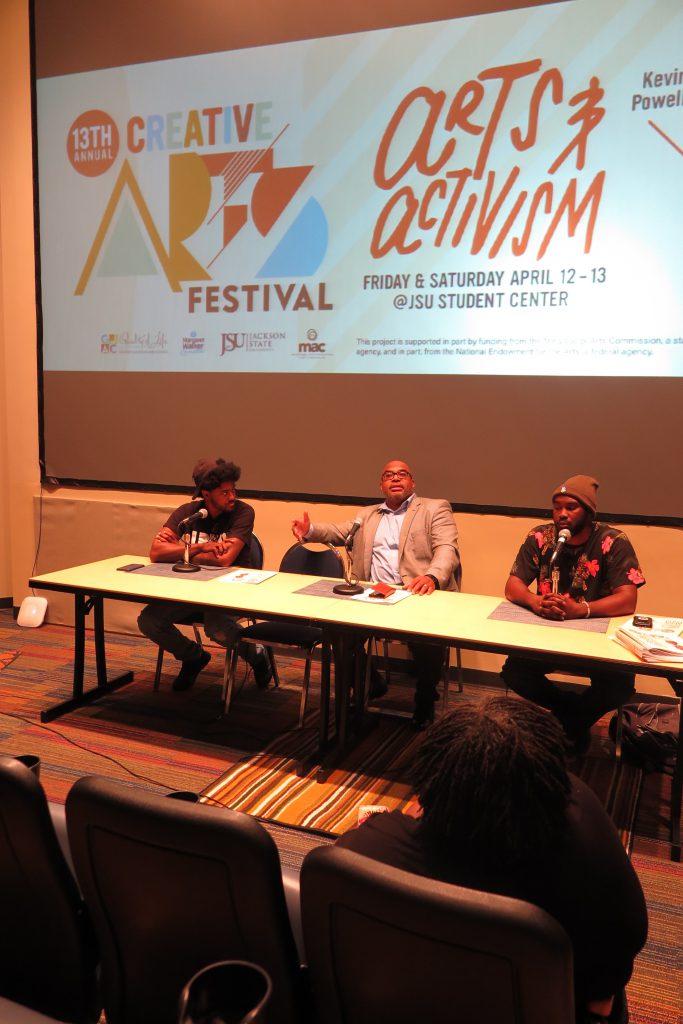
Holland, an author and award-winning journalist, penned “The Black Panther: Who is The Black Panther” for Marvel Studios; “The Invisibles: The Untold Story of African American Slaves in the White House;” and “Black Men Built the Capitol: Discovering African American History In and Around Washington.”
A native of Holly Springs, Holland disclosed that he almost passed on the opportunity to write the 2016 novel “Star Wars Finn’s Story” for Lucasfilm, one of the world’s leading entertainment companies founded by filmmaker George Lucas, creator of the “Star Wars” and “Indiana Jones” franchises.
“I said no to ‘Star Wars’ because ‘Star Wars’ approached me right after I finished writing ‘The Invisibles.’ That book took me seven years to write while working a full-time job,” he said. “I was writing from 10 p.m. to 2 a.m. for seven years.”
Furthermore, Holland said he promised his wife that he would take a two-year hiatus before accepting or producing any other creative projects. That is until ‘Star Wars’ called.
“I was completely honest with them,” the writer explained. “I told them that I promised my wife that I’m not going to do anything for two more years, but let me give her a call.”
Luckily, Holland’s wife gave her blessing. “She told me, ‘You better call them back,’ he shared before chuckling.
If he had not said “yes” to Lucasfilm, Holland would have missed the chance to write “Black Panther” and several impending opportunities. He also admitted that before “Star Wars” approached him, he had never written a novel.
“There are only so many doors that open for us in our lives. When that door opens, you better be ready to walk through it. Figure out how to do it once you get through the door,” he advised. “There are very few opportunities for us to learn on the job. So when you get that opportunity to take your work to another level, please say yes.”
In agreement with his fellow panelist, Rollins added, “The worst thing you can do is not try.”
The entrepreneur said when it came to opening his specialty shop Offbeat – which sells designer toys, comic books, records, and art – he just did it.
“I would’ve been a failure in my eyes if I did not try. You have to put forth at least an effort and try whatever creative avenues you want while you’re on this planet,” he urged.
And, according to Ransburg, a lack of money or connections should not be a hindrance when it comes to the pursuit of one’s craft. “Figure it out as you go. The answers will show up. You have a resource in hand. It’s your phone. Google is your friend,” said the artist, whose exhibit “PROTEST: Collective Action Leads to Change” opened in conjunction with the creative arts fest and can be found on the 4th floor of Ayer Hall
When it came down to the theme of this year’s festival, Holland later explained the importance of art as activism. “Art and literature are a fabulous way of expressing our inner thoughts and feelings without fear or judgment,” he said. “We can take the fear, pain, passions and pleasures of our life and express it in ways that others cannot.”
Art and activism
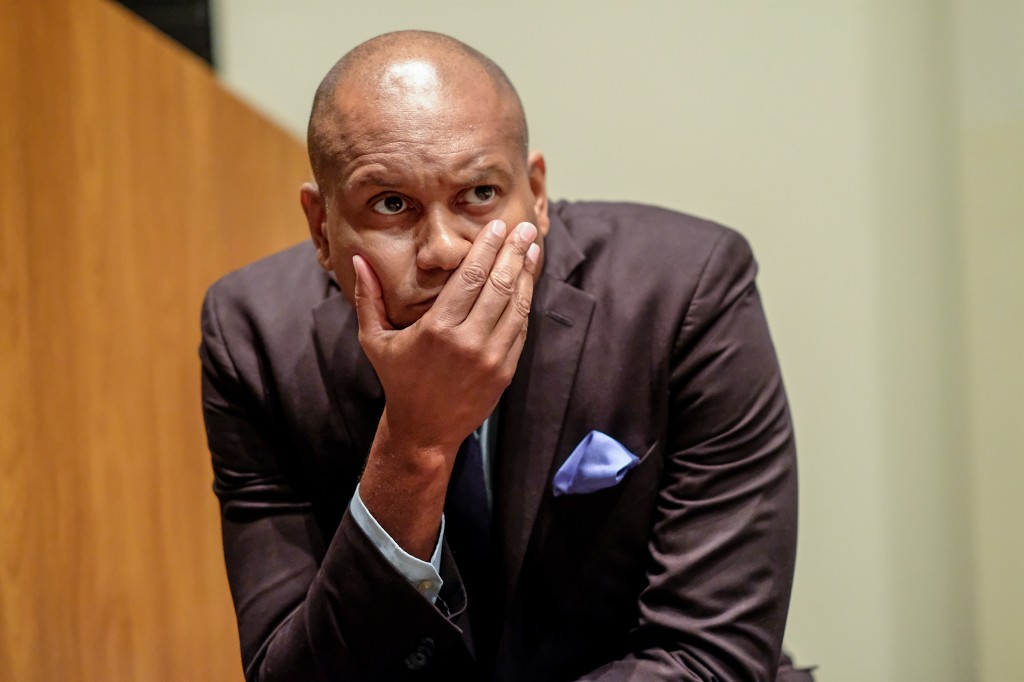
Kevin Powell, political activist, poet, writer and entrepreneur, paced the floor and weaved in between the seats as he shared his thoughts inside the JSU Student Center Theatre room on April 13.
“I want to talk about arts and activism, and I want to start with Mr. Roy Lewis,” said Powell referring to the 81-year-old photographer whose exhibit “Everywhere with Roy Lewis” opened in Johnson Hall, April 12.
Powell, whose work has appeared in media outlets from the New York Times and Rolling Stone to Essence and Ebony admitted that he had never heard of Lewis until Luckett made the introduction.
“He is like a lot of unsung artists and activists in our communities. You never hear about all the work that they do,” said Powell.
Lewis grew up on a Natchez plantation where his father was a sharecropper. For 60 years, he has been capturing iconic people and moments, such as images from the civil rights movement, with the click of his camera. His collection contains photos of the Rev. Martin Luther King, Stokely Carmichael, H. Rap Brown, and Muhammad Ali to name a few.
“He was in Africa when Ali famously knocked out George Foreman; The Rumble in the Jungle. He has pictures of Michelle and Barack Obama,” Powell emphasized. “I just said let me listen to the wisdom of this human being, and he told me his story. He’s another product of Mississippi.”
Powell also explained to listeners that while some activism is in the form of organizing, protesting and marching, others use a pen, camera, sing, dance, or create visual art.
He then referenced the recent death of rapper Nipsey Hussle, born Ermias Asghedon, who was tragically gunned down in front of his clothing store in the Crenshaw area of Los Angeles earlier this month.
“We’re talking about arts and activism. Well, Nipsey Hussle represented that. He was a brother from the community. Half his family was African-American. His other half was Eastern-African,” he said. “Somewhere in him (Hussle) understood that art and activism go together. Yes, I want to be a rapper. Yes, I want to be a rap star. But most importantly, I want to serve my community.”
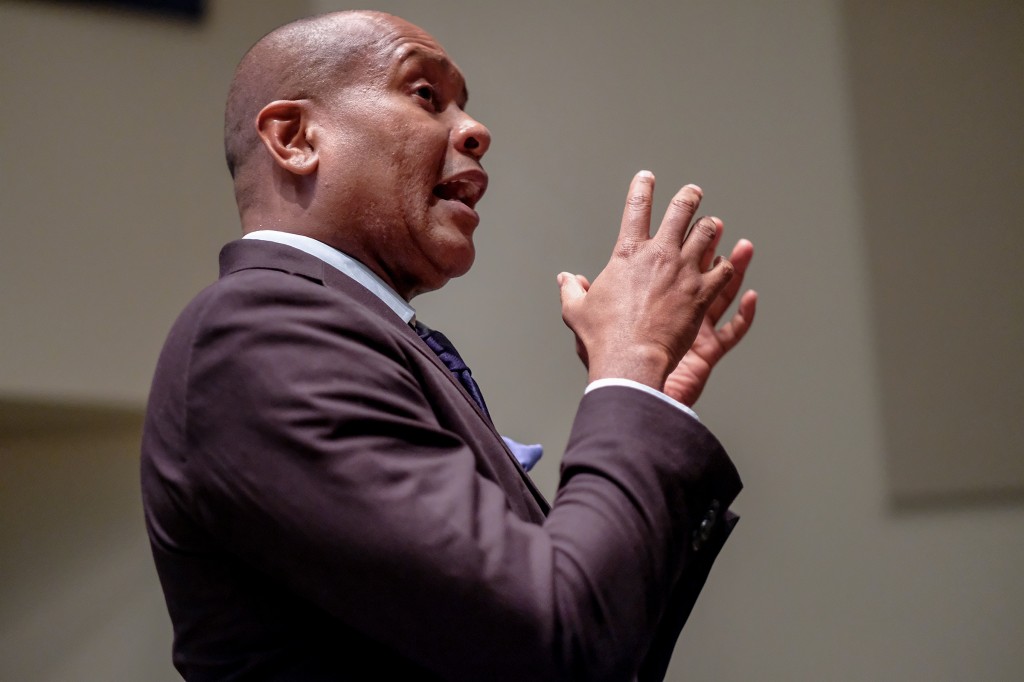
[dropcap]P[/dropcap]owell pointed out that the day Hussle was slain, the artist was providing free clothing to a man who had just been released from prison after serving 20 years.
“What better form of activism is that?” he asked. “Helping someone get a job; helping someone get a GED; helping someone get to community college; or helping someone get to Jackson State.”
Currently working on a biography of the late rapper Tupac Shakur, whom many regard as one of the greatest artists of all time, Powell later reflected on the murders of Hussle, Tupac, and Biggie Smalls, the New York rapper and prolific lyricist killed six months after Tupac.
“It made me think about systems of oppression that teach us to hate ourselves, and when you hate yourself, no matter who you are, you’ll hate people who look like you,” he said. “If you hate people who look like you, you have no problem cursing out people who look like you; hitting people who look like you; calling people all kinds of derogatory terms who look like you; picking up a gun and shooting people who look like you.”
The writer explained that systems of oppression breed the self-hatred and confusion that leads to the destruction of black people and communities of color.
Another example of self-hatred as it relates to art and activism, Powell shared, is the behavior of some who consider themselves progressive. “I believe now, if you’re truly progressive, how can you say you’re anti-racism, but you’re sexist? How can you say that you’re anti-oppression, but you’re homophobic or transphobic?” he asked. “How can you say, as a white sister, you’re feminist, but then you don’t support the rights of black women or women of color? You’re quiet about racism, but you have a lot to say about feminism.”
Powell then added, “We use the term intersectionality a lot, in these times, but very few practice it.”
The writer contended that real activism is a composition of one or several behaviors such as rooting oneself in his or her community to exact change; educating oneself about history; telling the truth about history and the human condition; and reading, studying and traveling to arrive at a broader sense of self.
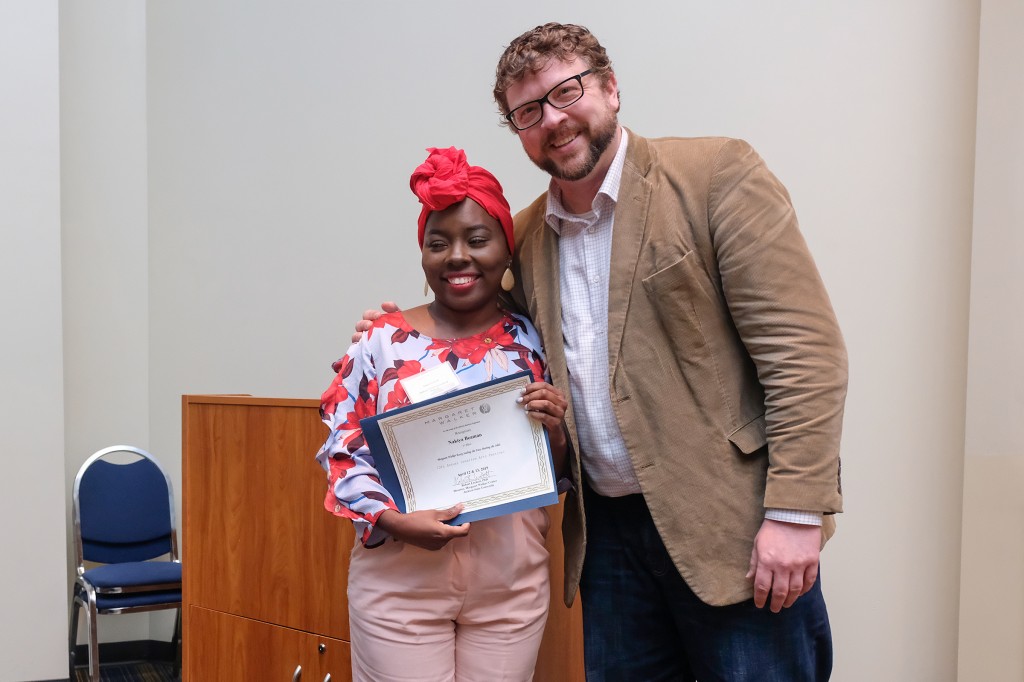
Beating the odds
Once Powell’s fiery and passionate presentation came to an end. The winners of this year’s Margaret Walker Essay Competition were announced.
Graduate student Nakiya Beaman won the $1,000 first place prize for her essay “Sealing the Fate and Beating the Odds,” which traced shared similarities in the lives of her mother, grandmother and great grandparents.
“I talked about how interconnected our experiences are as black people. We’re more homogenous than we believe,” she said.
Beaman disclosed that her great-grandmother and grandmother were both 16 when their schools were desegregated and her mom, grandmother and great-grandmother had children at 17, all aspects she explored in her paper.
“I also talked about health disparities and domestic violence that we (black people) experience generationally. I also talked about how my parents made me who I am today,”
An aspiring principal studying educational administration and supervision, Beaman said she found Powell’s perspective very profound.
“It’s nice to see a leader in the community supporting Jackson State and a creative arts festival like this and still believing in activism and the voice of HBCUs.”






